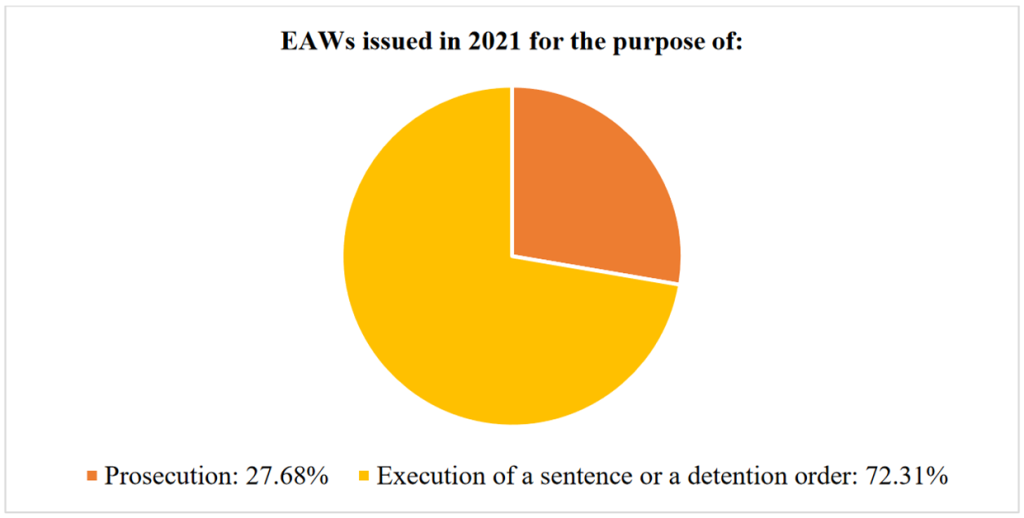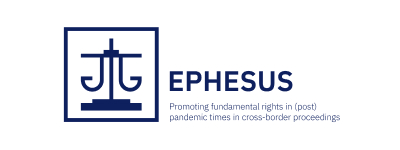IPS_Innovative Prison Systems partners a new European initiative focusing on streamlining a more human rights-attentive and proportional use of the European Arrest Warrant.
The outbreak of the Covid-19 pandemic forced EU judicial authorities to rapidly adjust to an increasingly constrained operating environments, which led, inter alia, to an adoption of digital technologies to ensure the course of proceedings. However, the use of these measures originated a number of concerns because of their impact on the fundamental and procedural rights of suspects and accused.
For instance, Fair Trials noted that the use of remote hearings may constitute a restriction on people’s rights to effective participation at trial”(i), thus breaching Article 6 of the of the European Convention on Human Rights(ii), on the Right to a fair trial.
Indeed, prompted by these developments, the European Commission has been making steadfast advances in promoting the increased digitalisation of justice (iii). This translated into the development of a digital toolbox (iv) and, the adoption of the Council conclusions on the digitalisation of justice, as well as efforts in promoting increased training on digitalisation among justice professionals, as laid out in the European Judicial Training Strategy 2021-2024(v).
The inevitable increased use technical advances in cross border proceedings also requires that justice professionals learn from and become more aware of the breaches of fundamental and procedural rights.
The European Arrest Warrant in this new reality
As in other cases, existing difficulties related challenges related to the use of the European Arrest Warrant (EAW) were considerably exacerbated or added to by the COVID-19 pandemic, leading to severe impacts and to additional complications in the field of judicial cooperation among EU Member States (vi). An unpredictable global scenario and serious health concerns notably caused an increase of particularly complex surrenders, namely due to force majeure reasons.
According to Fair Trials, difficulties in remote cases hinder observance of fundamental and procedural rights, especially the right to a fair trial, the right to examine evidence and witnesses, the right to confidential consultation with a lawyer and the right to be present at the hearing.
Additionally, these new problems cannot be properly addressed if there is not a consideration for additional issues that encircle the EAW, mainly, its sub-optimal and disproportionate use. Eurojust as underlined the fact that the “the EAW […] does not provide for the possibility of evaluation of the proportionality of an EAW by the executing Member State”.
Ultimately, this has serious implications for suspects, including deportation, separation for the person’s families, potential employment loss. Finally, the suspect may not be able to express themselves in the language of the country in which they are being prosecuted in. This situation is worsened by the wide scope of application of the instrument which, coupled with its streamlined procedures, creates conditions for its current widespread usage.
Finally, promoting a more proportional use of the EAW means a need to observe the possibility of the use of other European, less intrusive instruments, which may constitute a solution to some of the reasons basing the issuing of the EAW. Among these, special consideration should be given to FDs 2009/829 (European Supervision Order [EIO]), which could pose an alternative in the case of prosecution purposes, the European Investigation Order (EIO), that includes a provision calling on authorities to consider using it instead of an EAW as well as, to a lesser extent, FD 2008/947 (Probation and alternative sanctions), which could be considered in the context of the execution of sentences and in pursuit of the rehabilitation of the requested person.
In this sense, the European Parliament Research Service In this sense, the European Parliament Research Service has drawn attention to the importance of considering the EAW as “a subsidiary measure to other, less intrusive options, in the spirit of a common EU criminal justice area”.
As an example, the latest data stemming from the European Commission indicates that, in 2021(vii), a total number of 14,789 EAWs were issued. Of these, 27.68% for the purpose of prosecution, while 72.31% for the purposes of the execution of a sentence of a detention order. According to these numbers, one may wonder if those 27.68% could have been addressed through other instruments, namely the EIO and ESO.

Setting up the path a more effective and proportional use of the EAW
EPHESUS “Promoting fundamental rights in (post) pandemic times in cross-border proceedings” aims to implement a transnational and multi-dimensional action oriented towards paving the way to a more optimised and proportional use of the EAW. This overarching objective will be pursued by addressing both the quality of the use the EAW and the quantity of its implementation.
In practice, the Consortium aims to establish the groundwork for better supporting judges and prosecutors when dealing with fundamental and procedural rights breaches involving the use of the EAW; generate and expand awareness, knowledge, and practical competences of the target group to harness the full potential of mutual recognition instruments alternative to the sub-optimal use of the EAW; and to promote mutual learning and awareness-raising on the identification of fundamental and procedural rights breaches involving the use of the EAW, including in remote justice proceedings, as well on the primacy of the proportionality principle.
For these purposes, the EPHESUS project will develop a number of practitioner-oriented informative materials, as well as organise several national and international events, aimed at fostering awareness-raising, mutual learning and exchange of experiences among justice professionals.
To kick-start the project, the first the Consortium met in Athens, Greece, on the 23rd of February, for its first project meeting. This event provided the perfect opportunity for the partnership to get to better know one another and to establish clear goals for the coming months.
[i] Fair Trials, Beyond the emergency of the Covid-19 pandemic: Lessons for defence rights in europe, 2020, p.15. Available in https://www.fairtrials.org/articles/publications/beyond-the-emergency-of-the-covid-19-pandemic/
[ii] Council of Europe, European Convention on Human Rights, 1950. Available in https://www.echr.coe.int/documents/d/echr/convention_ENG
[iii] European Commission, Digitalisation of justice. Available in https://commission.europa.eu/strategy-and-policy/policies/justice-and-fundamental-rights/digitalisation-justice_en
[iv] European Commission, Digitalisation of justice in the European Union A toolbox of opportunities, Communication from the Commission to the European Parliament, the Council, the European Economic and Social Committee and the Committee of the Regions, 2020. Available in https://eur-lex.europa.eu/legal-content/EN/TXT/PDF/?uri=CELEX:52020DC0710
[v] European Commission, Ensuring justice in the EU — a European judicial training strategy for 2021-2024, Communication from the Commission to the European Parliament, the Council, the European Economic and Social Committee and the Committee of the Regions, 2020. Available in https://commission.europa.eu/system/files/2020-12/2_en_act_part1_v4_0.pdf
[vi] Eurojust, Report on Eurojust’s Casework in the Field of the European Arrest Warrant, 2021. Available in https://www.eurojust.europa.eu/sites/default/files/assets/2021-06-eaw-casework-report.pdf
[vii] European Commission, Statistics on the practical operation of the European arrest warrant – 2021 (staff working document), 2023. Available in https://commission.europa.eu/system/files/2023-07/SWD_2023_262_1_EN_document_travail_service_part1_v2.pdf
Learn more about this project

EPHESUS
Promoting fundamental rights in (post) pandemic times in cross-border proceedings
The consortium developing this European initiative is led by the Centre for European Constitutional Law (Greece) and is partnered by IPS_Innovative Prison Systems (Portugal), the University of Seville (Spain) the Center for the Study of Democracy (Bulgaria), and European Strategies Consulting (Romania).
Related projects

J-CAP Next
Judicial cooperation for the enhancement of mutual recognition regarding probation measures and alternative sanctions – EPP software 3.0

EMPRO
Empowerment of the Framework Decisions 2008/947 and 2009/829 through EU Probation Services

EUROProspects
Ensuring Probationers’ Rehabilitation Prospects via targeted enhancement of the implementation of FD 2008/947

JCAP
Judicial cooperation for the enhancement of mutual recognition regarding probation measures and alternative sanctions

PRE-TRIAD
Alternative pre-trial detention measures: Judicial awareness and cooperation towards the realisation of common standards

PRE-RIGHTS
Assessing the impact and performance of preventive measures on EU Directives and Framework Decisions
Related news

Creating a more effective and harmonised application of the Framework Decision 2008/947 to improve rehabilitation prospects
Read More »




